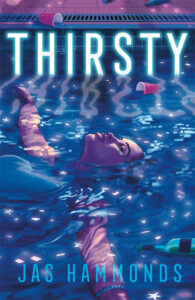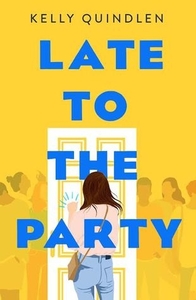Buy this from Bookshop.org to support local bookstores and the Lesbrary!
What would you be willing to do if it meant finding your flock? Jas Hammonds explores this age-old question in their young adult novel Thirsty. Incoming college freshmen Blake Brenner has been with her girlfriend, Ella, since freshman year; they are voted “The Couple Most Likely To Still Be Together In Ten Years” and are desperately in love. The duo is planning to go to Jameswell University and to join the exclusive Serena Society, along with their best friend, Annetta. As the summer begins, so does the Serena Society’s pledging process, which includes a fair amount of hazing. Blake is determined to prove herself—unlike Ella, who is a legacy pledge, Blake is the first in her family to go to college and has no connections or money to boost her status. However, in proving herself, Blake begins to develop an unhealthy relationship with both alcohol and partying, and she must decide what parts of herself to keep and which ones to banish.
This may be stating the obvious, but Thirsty is such a hard book to read, especially if you are an alcoholic or have dealt with alcoholics previously. I did cry at least twice and had to take self-mandated breaks while reading, so be prepared to do the same. But as hard and scary as reading Thirsty was, it also is incredibly healing, powerful, and such an important book to have out there. Narratives about alcoholism in teens/new adults feel rare, and I think that if I had read this in my early 20s, this book would have helped me curb some bad habits and/or thought patterns that existed at the time.
The characterization in Thirsty is realistic, to the point where I sometimes felt uncomfortable with how much I identified with some of the characters and their choices. Blake’s desires of solidarity and feelings of loneliness are heartbreaking to read, all while her euphoria acts as a sort of bandage to the reader’s emotions. I also heartily enjoyed Annetta’s role in Thirsty—in a book that is dominated by Blake’s relationship with Ella, Annetta’s scenes acted as a palate cleanser and a place to emotionally recuperate. Annetta’s relationship with Blake shows how friendships should be about support, even when it may be initially unwanted.
If you enjoy Elizabeth Acevedo, emotionally complex stories, and solidarity narratives, you can order your copy of Thirsty through Bookshop, your local indie bookstore, or your library.
Comp titles: Last Night I Sang to the Monster by Benjamin Alire Saenz, Ophelia After All by Racquel Marie, You’d Be Home Now by Kathleen Glasgow, and Full Disclosure by Camryn Garrett.
Content warnings include: alcoholism, hazing, accidentally outing, transphobia, intentional outing, cheating, vomiting, and vandalism.


